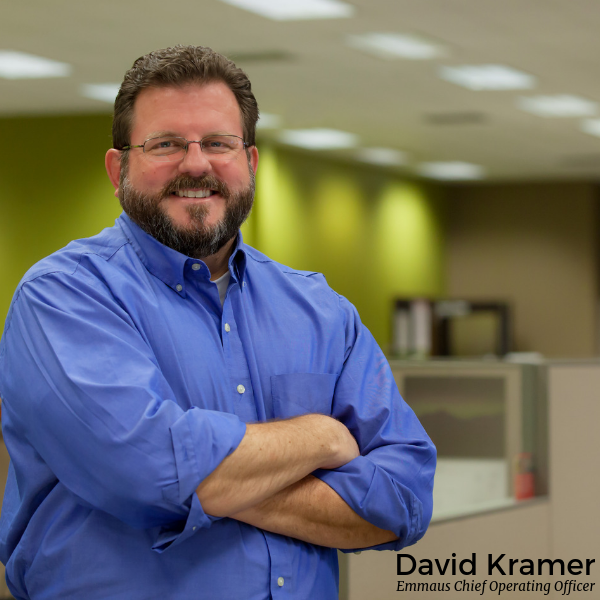Written by David Kramer, Chief Operating Officer
There are a few folks currently with Emmaus who actually knew me when I began my career some 27 years ago as a Developmental Assistant 1 (the state’s version of a Direct Support Professional) at Bellefontaine Habilitation Center. I am very blessed to say that some of those friends are now Emmaus clients and I am still able to still with them on a regular basis. Probably like many Direct Support Professionals, I had absolutely no idea what I was getting into or what exactly to expect. While growing up in the Jefferson Barracks neighborhood of South County, I had two boys on my street, one older, one younger, both with developmental and physical disabilities. Back then, schools were not integrated, and so our periodic games of kickball and kick-the-can were my only exposure to the world of disabilities. And, I certainly didn’t receive any formal training specific to developmental disabilities while getting my degree in Psychology.
After 4 weeks of training, I was assigned as a Direct Support Professional (DSP) to a home that I had never visited. And in reality, it didn’t matter much. As the newbie, I was pulled almost every day to work in homes other than the one I was assigned. Often times, I was supporting folks who communicated through challenging verbal and physical confrontations. Many were extremely street smart. I sincerely loved my work, feeling like I was making an impact through informal counseling on such things as personal responsibility, values, etc.
While this population description applied to basically my entire unit, it only comprised about a fifth of the entire 400+ people residing at the Hab Center. Later in my career, I gained an understanding and appreciation for the extreme diversity in clients and their needs. The Elliott building housed many people who had severe physical disabilities and required hands-on care in their lives and needed help with eating, bathing, toileting, etc. Though many spoke in their own fashion, very few were able to verbally communicate. As a Unit Manager, I recall sharing with some of my DSP friends who worked in the Elliott unit that I didn’t think I could do their job. In fact I was unsure if my career would have continued in the field if that was the original population I served. Much to my surprise, they responded by saying they couldn’t work with the population in my original unit. They pointed out the constant manipulation, verbal and physical threats, likewise sharing it would have stopped their career in the field as well. I never even considered our views could have been so different on the persons we supported.
This experience has always taught me never to stereotype DD services or the people who receive them. Each home, each person, and each service is individual in nature. I believe this applies to our Emmaus team members as well. Matching ourselves to the persons we are serving is as important as matching our housemates. Please take the time to find your matches.

